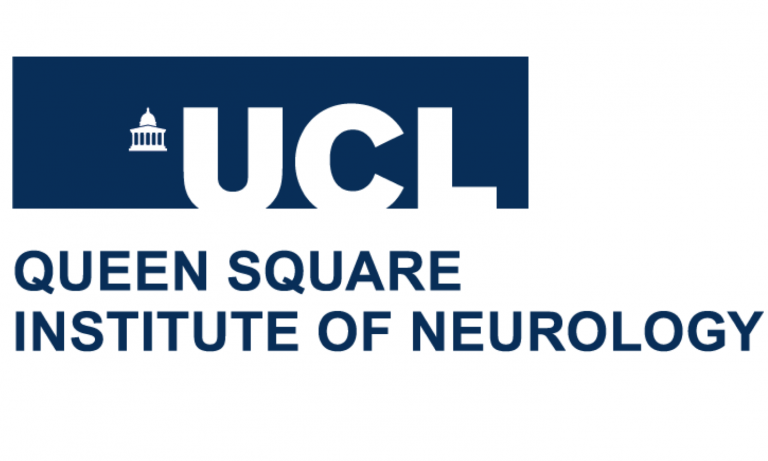UCL Queen Square Institute of Neurology celebrates achievements at 60th Annual Address
25 October 2024
A review of the year by Professor Michael Hanna (Director of UCL Queen Square Institute of Neurology), followed by the Annual Address by Professor Patrick Chinnery (Executive Chair, MRC) on “Medical Research - dial 111" and a vote of thanks by Professor Geraint Rees.

Review of the year
Professor Hanna began by welcoming the speakers and Aimie Chapple, UCL Vice-President (Operations) and thanking the ION leadership and Professional Services team for their contributions over the past year, and acknowledged support from the Faculty and Divisions, and all our external partnerships and supporters.
He paid specific thanks to staff who had left ION in 2024, including Dr Rina Bandopadhyay, Latha Rowles, Robert Courtney and Kamlyn Ramkissoon, and the loss of esteemed colleagues Professor Richard Orrell and David G.T. Thomas.
Professor Hanna highlighted the significant progress made over the past year. The ION published nearly 1,900 peer-reviewed articles, and currently holds over £350m in active grant funding.
He showcased wide-ranging examples of ION's research impact and initiatives including an influential early paper on the neurological impact of COVID-19, development of SPM software, Queen Square MND Centre Symposium, surgical robotics, ALS disease mechanisms, Optimas stroke trial, plasma biomarkers for dementia diagnosis, re-purposing ambroxol in Parkinson's Disease, the EJS ACT-PD platform, EpilepsyGTx spinout, innovative MS trial designs, and the opening of the Rare Dementia Support Centre in 2025.
Professor Hanna highlighted our Translation and Enterprise activities, including the work of LWENC and the first gene-silencing drug in Alzheimer’s disease, the Genetic Therapy Accelerator Centre, led by Professor Francesco Muntoni, and the UCL Spinout AstronauTx. He also highlighted the new Neuroscience, Cancer and Hearing Advanced Therapy Research Pharmacy and Queen Square Clinical Trials Centre which are due to launch in 2025. He also gave an update on the dual hub for translational neuroscience on Grays Inn Road which will open in 2026, including core technology platforms.
These achievements were complemented by many individual ION researchers' awards and appointments, including Professor Sarah Tabrizi's election to US National Academy of Medicine and as Fellow of the Royal Society, Sir Demis Hassabis' Nobel Prize, Professor Gillian Bates' Royal Society Medal, Professor Mary Reilly's Alan J. Gebhart Prize, Professor Kailash Bhatia's appointment as the European Academy of Neurology President-Elect, Professor Andrea Malaspina's Healey International Prize for Innovation in ALS, and Dr James Sleigh's MRC Senior Clinical Fellowship, alongside 100% success in 2024 senior and early career promotions.
Professor Hanna also highlighted ION-wide EDI initiatives, including EDI awards, as well as Educational achievements, including the new Human Neuroscience BSc, and ION's sustainability initiatives, including the Hot Brain Conference, organised with Lancet Neurology.
All these achievements are covered in the ION Annual Review which was launched at the event.

Professor Hanna then awarded the Queen Square Essay Prize to Dr Kyriakoula Varmpompiti.

Professor Hanna concluded by looking back at the innovation and impact of the ION in the 47 years since Queen Square House was opened, including thrombolysis treatment, diagnostic neurogenetics, pioneering MRI and DBS and epilepsy surgery. He highlighted the success factors which will be realised in the future at the translational neuroscience facility on Gray’s Inn Road.
He then introduced Professor Patrick Chinnery's Annual Address.
Annual Address
We were delighted to welcome as the guest speaker Professor Patrick Chinnery, Executive Chair, MRC: “Medical Research - dial 111".

He gave an overview of the history of the MRC - now in it's 111th year - from Walter Morley Fletcher, through the Haldane Report, to Henry Dale and the NIMR, and MRC Units around the country. He detailed how discovery science has been central to its purpose from the start, and what we can learn from this today: the sub-title of his talk being "what goes around comes around" .
He identified the next big challenges for medical research, including the emerging public health crisis of neurological disorders; and the complex and challenging funding landscape. He highlighted how MRC should recognise its distinctive role: in funding high risk, high reward, mechanistic science, which drives translation. He emphasised the importance of partnerships, with NIHR, industry and universities, and UKRI investment in initiatives including the UK Biobank and Health Data Research Network, and the development of MRC Centres of Research Excellence.
He closed with a focus on the declining clinical research workforce, and its related drivers, disincentives and new pressures, and a forthcoming action plan to address these.
Vote of Thanks
Closing remarks were given by Professor Michael Hanna, following the vote of thanks by Professor Geraint Rees, UCL Vice-Provost (Research, Innovation & Global Engagement)
Professor Rees started by reflecting on the immense impact of ION research, and the complex challenges for funders in a changing demographic landscape and global ecosystem.
He specifically thanked Professor Chinnery for the MRC's longevity and indefatigability; for showing the importance of how medical research is conducted; and for his leadership.

Image (left to right): Professor Geraint Rees, Professor Patrick Chinnery, Professor Michael Hanna
Links
- Recording of Annual Address
- UCL Queen Square Institute of Neurology Annual Review
- UCL Queen Square Institute of Neurology Infographic
 Close
Close

